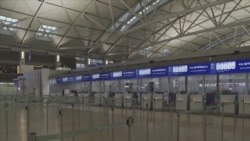It’s no secret most of the world’s airports have sat empty for months.
With international travel almost nonexistent because of the coronavirus pandemic, the global tourism industry is finding new ways to make money. In Asia, one way companies are trying to stay profitable is through so-called "flights to nowhere."
That's right, some airlines are offering flights that end up right where they began. While it may sound like a gimmick, customers are actually buying tickets.
This month, a Taiwanese airline took passengers to South Korea’s Jeju Island, circled a few times and flew right back to Taiwan. In the air, they had a Korean language and culture lesson.
One passenger, 35-year-old Liu Chun Hui, says she couldn’t go abroad. So her friend recommended this flight to her. As soon as she heard about it, she wanted to experience the flight to nowhere.
The flights aren’t cheap. Australia’s Quantas airline charged almost $800 for an economy seat on a flight that offered views of attractions such as the Great Barrier Reef. The flight sold out in 10 minutes.
In Japan, the flights don’t even leave the ground. An entertainment company offers flights in a fake airport cabin. Passengers get meals and tour famous sites through virtual reality headsets.
Hirari Ito was among the virtual flight attendants. She’s never been one in real life and says it was hard to learn how to become one now.
“We’ve been changing and trying to improve every day, so I hope it will last for a long time in the long run,” she said.
The trend is a sign people are eager to be done with quarantine and other restrictions, says digital marketing analyst Mingming Chen.
“The problem is, if you want to travel to other countries, you have to go through all the safety procedures, you have to get your COVID-19 tests, and you need to go through quarantines. And that’s really not convenient for a lot of people.”
But while the flights to nowhere may provide a boost for travel companies, they don’t help the broader tourist industry. Here in Seoul, many shopping districts that rely on foreigners are mostly empty, waiting for the flood of tourist dollars that may not come anytime soon.






